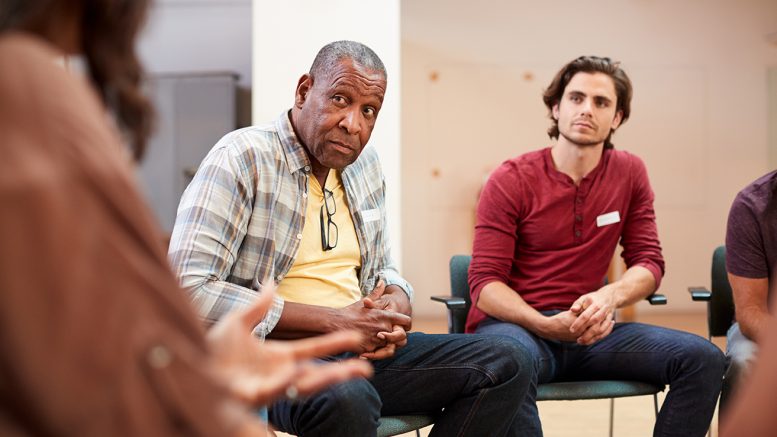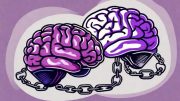One Man’s Account of his Hodgkin Lymphoma Diagnosis to Raise Awareness
‘No man should hide behind being a man when there’s something wrong with their body, the outcome can be quite devastating.’
Globally men die on average five years earlier than women and for reasons that are largely preventable. Men’s Health Awareness Month, aka Movember, works to tackle this men’s health crisis by funding ground-breaking projects and encouraging more open conversations about men’s health. Thanksgiving in the US also marks National Family Health History Day. The day promotes the value of sharing and understanding health risks that may exist in families and having conversations around disease, risk profiles and managing health. Whilst November is coming to a close, it’s never too late to focus on some of the health issues encountered by men. The more we can be proactive in managing our health and taking personal responsibility, the greater the chances are that we safeguard our well-being and protect those we care about. This approach will also lift some of the burden from our health ecosystem as we educate and inform one another to be vigilant to health issues.
We spoke with Odu Bamgbose, Account Director with mdgroup – the global digital and patient health services company, pioneering a patient- first approach to clinical trials – about his own cancer diagnosis. Odu sees daily how patients are impacted by serious diagnoses and are faced with complex treatment regimens and placed under scrutiny in clinical trial programmes to seek new therapies. It is a journey that leaves most patients distressed, disorientated, sometimes dehumanised as they feel themselves becoming another medical statistic and data element in a complex programme.
Becoming a ‘patient’ himself, Odu faced the same challenges personally and now wants to encourage more men to speak openly about health. As a professional in the health ecosystem too, and notably in the clinical research space where the role of the patient is vital, Odu’s experiences also provide insight into how the industry can improve patient servicing, to make every individual, regardless of age, gender, race or diagnosis, have access to the best and most supportive care to most rapidly move toward optimum health.
Diagnosis
In November 2020, Odu started experiencing a pain in his side. Eventually the pain worsened until he had to ask his wife to call an ambulance. The father-of-two was initially told the issue was probably his gall bladder. However, a second opinion led to further tests, including a biopsy, and in January this year, Odu was told he had B-Cell non-Hodgkin lymphoma. The call came on his birthday.
Odu was unaware the biopsy had been looking for cancer but the specialist reassured him his prognosis was good. “The thing that stopped me from maybe just losing the plot was being told it wasn’t going to kill me,” says Odu. His immediate challenge was then telling his wife and daughters about his diagnosis.
Odu says no one sat down with them as a family to explain what was happening and, even if support had been available, the onus was on him as the patient and the family to seek it out rather than them coming with information.
Despite coming from a patient servicing environment, that experience was a first hand painful realisation, beyond the actual diagnosis, of just how vulnerable any patient feels when faced with managing any serious condition. The support Odu received from his employer was, however, ‘incredible, throughout the whole process’. As he explains, ‘Given how mdgroup specialise in listening to and supporting the needs of the patient, they understood and gave me all the time and support I needed to overcome this. They took all my worries away so that I only had to think about fighting my illness and getting better. I realised how valued I felt as team member. That meant a great deal and was one of the steep learning curves, seeing in times of challenge who comes to the plate and who you can truly rely on. I was very lucky to have that support both at work, as well as from my family.
Starting treatment
Following his diagnosis, Odu was told he would be put on R-CHOP chemotherapy, the most aggressive treatment. He was not asked about his priorities, for example if he was thinking of having more children, before this decision was made. He equally found the impact on his body, including his nails turning black and falling out, hair loss and extreme fatigue, overwhelming.
In seeking support outside of his chemotherapy sessions, his initial experiences of the helpline he was told to call were ‘quite dismissive’. This led to him becoming cautious, doubting himself about calling and feeling like a ‘pest’.
A crucial turning point in Odu’s relationship with medical staff came when a blood clot was missed after his third cycle of chemotherapy. Until that point, he had allowed himself to be ‘railroaded’ because he believed in the experts.
“I had literally withdrawn into myself and abdicated responsibility. The medical team failed me is the way that I look at it because the outcome of that could have been quite disastrous.”
In future, Odu says he would always be ‘self-policing’ and advises others to do the same.
“Learn as much as you can. I’d let a lot of things happen and a lot of decisions be made for me. My realisation on that came only later in my journey.”
Odu has not received any feedback or an apology about the missed blood clot.
The toll of the ‘charm offensive’
Odu also faced an additional toll to secure equal treatment as a black man.
He experienced people who were not happy treating or dealing with him because of the colour of his skin. This led to him constantly feeling like he had to be on a tiring ‘charm offensive’ to ensure he got the right treatment, at a time when his energy levels were at their lowest ebb.
At one point, Odu’s lead cancer nurse said his case would be interesting because they had not treated ‘an ethnic person with his cancer here before’. This obviously undermined his confidence and shocked friends and family, but Odu let it go because he wanted to continue being treated at his local hospital.
Post-treatment support
Odu feels ‘very blessed’ that he went into remission just eight months after first noticing a pain in his side and does attribute the speed of care with the outcome. However, he is still struggling with the effects of his treatment, particularly fatigue and feels more post-treatment patient support is needed.
“When it hits, and there’s no warning sign, it’s like you’ve been run over by a bulldozer twice. Every movement is a struggle,” he said.
“They’ve given you something that has killed everything in your body,” he said. “It’s done the job that it needs to do, but now, your body has to have a rebirth as it were.” Going it alone is how that journey can feel without a good support network.
‘Wear your fear coats’
Aside from the physical toll, his cancer and treatment has impacted other aspects of Odu’s life.
His compromised immune system meant he had to give up swimming and foods he enjoyed.
The additional burden of shielding during COVID-19 left him feeling ‘pretty much a prisoner’ and he went down some ‘very, very dark roads’.
However, Odu found support through three crucial groups – his family, his best friends and fellow members of the ManKind Project (MKP), a non-profit group encouraging men to nurture their emotional wellbeing – ‘changing the world, one man at a time’.
He advises other men to allow themselves to be emotionally vulnerable: “Be a man and not in the context we think men should be. Be brave enough to face your fear and explore uncertainty with your health.
“Wear your fear coats, wear your vulnerability coats because the reactions of people will surprise you.”
“I’ve been able to show my vulnerability to my immediate family. We have talked shared and been on a journey together. But I’ve also been able to show my strength and hopefully be a good role model for them as well.”
‘Don’t leave it too late’
Odu encourages all men to own what is happening with their bodies and tell someone if they notice a change: “Doctors have seen everything once, twice, 1,000 times.
“They’re the ones that are going to help you. Even if they haven’t got the best people skills in the world, they’re the ones that are going to give you the right diagnosis and give you the right treatment.
“No man should hide behind being a man when there’s something wrong with their body because the outcome can be quite devastating if you leave things too late.”
‘Think of patients as a guest in your home’
Prior to joining mdgroup in July 2020, Odu’s background was in hospitality and training. For him, the principles of good service and going the extra mile apply even more critically within the health sector as any.
There must be consistency in care quality whether it is delivered on site, during a mobile health visit or over the phone.
Clear communication around treatment options and patient priorities is crucial for empowerment.
Accessibility and diversity must be increased throughout the healthcare system – from recruiting trial participants to researchers and HCPs.
Wherever possible, patients must be able to stay close to home to access services.
Personalised support should be offered to participants and their families throughout their patient journeys.
One size does not fit all, and services need to be considered from a patient point of view.
“Look at the patient as a customer, or as a guest in your own house,” says Odu. “And if you were in that position, what would you like, to be happening to you? How would you how would you like to be treated?”
To conclude Odu says, “I am pleased to be an ambassador for patients and the patient centred approach of the organisation I represent. I am also keen now to set up my own support group in area and to further promote the importance of men understanding their health risks and maintaining good conversations around health and wellbeing.”
About the author
Odu Bamgbose is Account Director at mdgroup. mdgroup offers digital and patient health services which put patients at the forefront of clinical trials. Find out more about its white-glove services at mdgroup.com.





